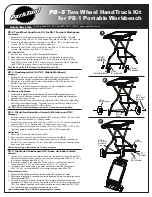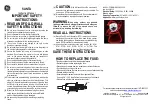
Note: the quick exhaust valve on the air cylinder
(see page 2) may be rotated, if this provides an easier
connection.
Before attaching the coupler, make certain you will
not damage any components on the other side.
If you have chosen to attach the bracket under the
driver’s seat, make certain that the female quick coupler
and bracket will not interfere with the normal movement
of the driver’s seat, or affect any adjustments to the
driver’s seat.
•
If you have chosen to attach the bracket to the kick
panel, attach it with two of the supplied ¼" nuts and
bolts, with the female quick coupler pointing toward the
rear of the towed vehicle.
•
If you have chosen to attach the bracket under the
driver’s seat, route the air line from the firewall to the
front edge of the driver’s seat. Remove the rocker panel
or side trim (or, detach the carpeting) and conceal the
air line underneath it.
Move the driver’s seat back, as far as it will go.
Attach the bracket with two of the supplied ¼" nuts
and bolts, with the female quick coupler pointing toward
the front of the vehicle.
11.
Cut the air line to length and attach it to the com-
pression fitting on the female quick coupler. Use the
same method described in step 3 (above) to attach the
air line.
12.
Seal the firewall grommet with a silicone sealant.
Reattach the rocker panel (or side trim or carpeting),
if it was removed.
13.
Find a suitable location at the rear of the motorhome,
near the center, to attach the remaining preassembled
female quick coupler (
with
the orange shield base —
Figure 13). Attach the bracket with two of the supplied
¼" nuts and bolts, with the female quick coupler point-
ing away from the motorhome.
Note: the weather covers will prevent dirt or debris
from entering the lines. Keep the fittings covered when
the braking system is not in use.
figure 12
inStAll AiR lineS in the toWeD vehicle
continued from preceding page
“hot” components such as the engine or the exhaust
system. Do not kink the air line, or bend it to the extent
that it crimps or creases.
Where appropriate, use wire ties to secure the air
line in place.
8.
Next, look for a pre-existing hole in the firewall (or,
if there is sufficient space, a pre-existing wiring grom-
met) on the driver’s side, to route the air line through
the firewall.
If there is no pre-existing hole or grommet with suf-
ficient space, drill a ½" hole through the firewall.
Drill from the engine compartment or from the in-
terior of the vehicle, whichever is more convenient.
Before drilling, make certain you will not damage any
components on the other side of the firewall.
9.
Fit the included firewall grommet into the ½" hole,
and push the end of the air line through.
10.
The air line will be connected to the preassembled
female quick coupler
without
the orange shield base
(Figure 12).
Find a likely mounting point for the bracket on the
driver’s side — choose an area within easy reach, with
a surface of sufficient strength to hold the mounting
bracket firmly in place.
The bracket and quick coupler must not present
an obstacle or hazard to the driver of the vehicle, or
otherwise interfere with the operation of the vehicle.
Two common mounting points are: 1) under the
dashboard, on the kick panel; or 2) far enough under
the front of the driver’s seat so that the quick coupler
is accessible when the seat is slid back, but concealed
when the seat is slid forward.
Or, depending on the interior design of the vehicle,
there may be a more suitable mounting point.
Before attaching the bracket, first connect the
BrakeMaster air cylinder assembly. Make certain that
the male quick coupler at the end of the air line will
reach the point you have chosen to attach the female
quick coupler, without kinking either of the air lines.
toWeD vehicle
motoRhome
figure 13
9
Summary of Contents for BrakeMaster 9100
Page 4: ...2...










































